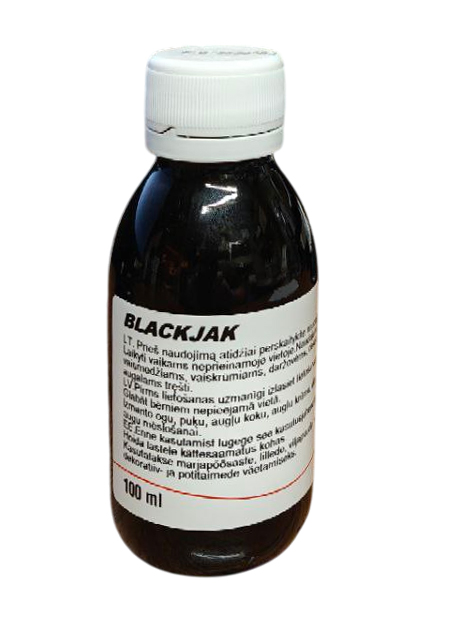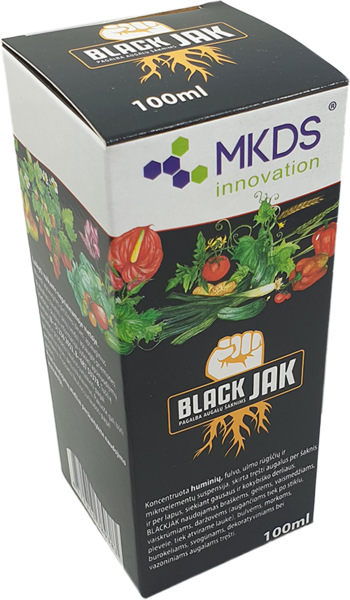Ex Tax: 3.95€
Used in organic farming.
Concentrated suspension of organic fertilizers, consisting of humic, fulvic and fulminic acids, designed to fertilize plants through the roots and leaves of plants in order to obtain a rich and high-quality harvest. Effective for soaking seeds, tubers and seedling roots.
It is used for fertilizing garden strawberries and berry bushes, fruit trees and flower crops, ornamental and pot plants, for all vegetable crops.
Structure:
Organic matter: not less than 28%.
Humic acid, fulvic acid, nucleic acid: at least 20%.
Organic nitrogen (N) -1.1%.
Acidity: pH: 4-5.
Benefits:
● significantly increases harvest productivity
● soaking the seeds, bulbs, tubers or roots of plants has a positive effect on the vigor of germination
● stimulates the development of the root system
● stimulates the assimilation of micro- and macroelements by the plant by creating a favorable environment for the vital activity of beneficial microorganisms
● mixing BlackJak with mineral fertilizers increases their effectiveness.
Other use cases:
1. Soaking the seeds before sowing: Soak the seeds in a solution of 5 ml / 1 L of water the day before sowing to help the seeds germinate faster.
Soak tubers (potatoes, onions, etc.) a day before planting in a solution in a ratio of 25 ml / 10 l of water.
2. Dosing with drip irrigation: after planting in the soil every 3-4 weeks at a rate of 30-50 ml / 10l / 100 m².
3. Foliar spraying: in a ratio of 5 ml / 10 l of water.
STORAGE: do not store at temperatures below 0 ° C and above + 40 ° C. Under normal storage conditions BlackJAK maintains its physical, chemical and biological properties.

* Humus is the most important part of soil organic matter, which includes humic, growth, biological substances and vitamins. The more humus, the more fertile the soil.
Humus contains 90% of soil nitrogen, 80% of sulfur, 60% of phosphorus. When humus and organic residues decompose, a lot of carbon dioxide is released, which serves as a source of carbon nutrition for plants.
Humus is a universal system that determines and regulates the level of structure, density, water-holding capacity, acidity and other factors that contribute to the growth of soil fertility.
Humus increases the efficiency of mineral fertilizers and creates a supply of nutrients and physiologically active substances needed by plants.
The source of humus in the soil is the organic remains of plants, microorganisms, and animals. The supply of humus is increased by the systematic application of organic fertilizers, with which ready-made humic substances enter the soil in significant quantities.
* Humus is not only a gift from Nature, but also its smart solution, which is the BASIS OF THE AGROPHYSICAL PROPERTIES OF THE SOIL.
Vermicompost is a natural product for plant care, including a complex of environmentally friendly nutrients, humic substances, stimulants for plant growth and development.
CONTAINS: natural humates, fulvic acids, amino acids, vitamins, natural phytohormones, a complex of micro- and macroelements, chitinase (a natural enzyme that repels harmful insects).
Its bactericidal properties are due to the presence of bacteriostatic proteins secreted by the tissues of the earthworm itself, and antibiotics secreted by symbiont microorganisms located in the intestines of the earthworm during the processing of organic matter.
DESIGNED for use in agricultural production, horticulture, floriculture, for growing vegetable and flower crops, growing seedlings, on personal plots, both in open ground and in greenhouses, when growing lawns and in landscape design. It is used for root and foliar feeding of plants. Effective with capillary irrigation. Used as a component for preparing soil mixtures and fertilizers.
ADVANTAGES AND VALUE OF BIOHUMUS:
* prevents the development of pathogenic microorganisms, suppresses putrefactive processes, neutralizes and disinfects the soil;
* humic acids dissolve and retain heavy metals in the soil and prevent them from entering plants;
* does not clog, but cleanses the soil;
* helps neutralize peat acidity and normalize soil pH;
* provides natural and complete nutrition to everything growing on earth: its presence has a positive effect on the processes of growth, metabolism and photosynthesis, stimulates biological processes in plants, improving their respiration, the formation of vitamins, mono- and polysaccharides;
* at different stages of plant development, it activates their vegetation and fruiting, which helps to increase the yield of a wide variety of agricultural crops;
* allows you to produce high-quality and environmentally friendly agricultural products and plants, and reduce losses during their storage.
When using it, plants practically do not get sick!















